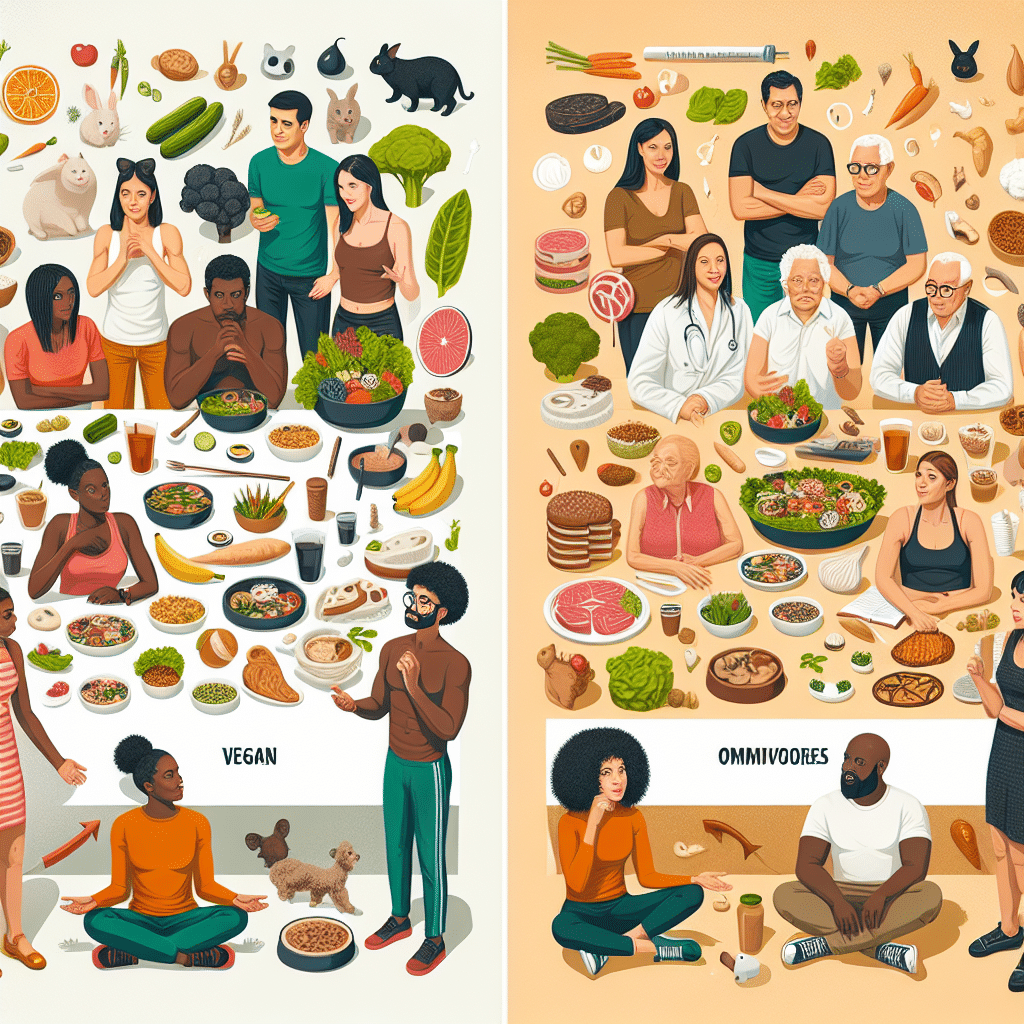Vegans vs Omnivores – Who Has Healthier Behaviors?
-
Table of Contents
- Vegans vs Omnivores: Comparing Healthier Behaviors and Outcomes
- Understanding Vegan and Omnivorous Diets
- Nutritional Intake and Deficiencies
- Disease Risk and Health Outcomes
- Physical Activity and Lifestyle Choices
- Environmental and Ethical Considerations
- Case Studies and Statistics
- Conclusion: Balancing Diet and Lifestyle for Optimal Health
- ETChem’s Protein Products for Vegans and Omnivores
Vegans vs Omnivores: Comparing Healthier Behaviors and Outcomes

The debate between vegan and omnivorous diets has been a topic of interest for nutritionists, environmentalists, and health-conscious individuals for years. The question often arises: who exhibits healthier behaviors, vegans or omnivores? This article delves into the lifestyle choices, health outcomes, and dietary patterns of both groups to provide a comprehensive understanding of their health-related behaviors.
Understanding Vegan and Omnivorous Diets
Before comparing the health behaviors of vegans and omnivores, it’s essential to define what each diet entails:
- Vegan Diet: Excludes all animal products, including meat, dairy, eggs, and often honey. Vegans typically consume a plant-based diet rich in fruits, vegetables, legumes, grains, nuts, and seeds.
- Omnivorous Diet: Includes both plant foods and animal products such as meat, fish, dairy, and eggs. Omnivores have a more varied diet that can range from highly processed foods to a diet rich in whole foods.
Nutritional Intake and Deficiencies
One of the primary concerns when comparing vegan and omnivorous diets is the potential for nutritional deficiencies. Vegans need to be mindful of obtaining enough vitamin B12, iron, calcium, omega-3 fatty acids, and vitamin D, which are more readily available in animal products. However, a well-planned vegan diet can provide all necessary nutrients through fortified foods and supplements.
Omnivores, while having easier access to certain nutrients, may also face health risks if their diet is high in processed meats and low in fruits and vegetables. The balance and quality of the diet are crucial for both groups.
Disease Risk and Health Outcomes
Research has shown that vegans often have lower rates of heart disease, high blood pressure, type 2 diabetes, and certain types of cancer. This is attributed to a higher intake of dietary fiber, antioxidants, and phytonutrients found in plants. Additionally, vegans typically have lower body mass indexes (BMIs) and cholesterol levels.
However, omnivores who consume a diet rich in lean meats, fish, and a variety of fruits and vegetables can also achieve excellent health outcomes. The Mediterranean diet, which includes moderate animal product consumption, is often cited as an example of a healthy omnivorous diet.
Physical Activity and Lifestyle Choices
Health behaviors extend beyond diet. Physical activity, smoking, alcohol consumption, and sleep patterns also play significant roles in overall health. Studies suggest that vegans may be more likely to engage in regular physical activity and less likely to smoke or drink heavily compared to some omnivores. However, these behaviors are highly individual and can vary widely within each group.
Environmental and Ethical Considerations
Many vegans choose their diet not only for health reasons but also for environmental and ethical concerns. The production of plant-based foods generally requires fewer resources and results in lower greenhouse gas emissions than animal agriculture. Ethical vegans also avoid animal products to protest against animal cruelty in farming practices.
Omnivores who are environmentally conscious may opt for sustainably sourced meats and dairy products, reduce food waste, and support local farming to mitigate their environmental impact.
Case Studies and Statistics
Several studies have compared the health outcomes of vegans and omnivores. For instance, the Adventist Health Studies found that vegetarians and vegans had lower risks of certain diseases and longer life expectancies than meat-eaters. However, these studies also emphasize the importance of dietary quality among omnivores.
Statistics show that the prevalence of obesity and related chronic diseases is lower among vegans. Yet, this does not imply that all omnivores are less healthy. Many factors, including genetics, lifestyle choices, and socio-economic status, contribute to these health outcomes.
Conclusion: Balancing Diet and Lifestyle for Optimal Health
In conclusion, both vegans and omnivores can exhibit healthy behaviors, but the key is in the quality and balance of the diet, along with other lifestyle choices. A well-planned vegan diet can provide all necessary nutrients and health benefits, while omnivores can also achieve good health by choosing lean proteins, and a variety of fruits and vegetables, and practicing moderation with processed foods.
Ultimately, individual dietary needs and preferences should guide one’s choice between a vegan or omnivorous diet, with a focus on whole foods, nutrient density, and a balanced lifestyle.
ETChem’s Protein Products for Vegans and Omnivores
Regardless of dietary preference, protein is an essential macronutrient for everyone. ETChem offers a range of high-quality protein products suitable for both vegans and omnivores. Their plant-based protein options cater to vegans looking for alternative sources of protein, while their animal-based collagens are perfect for omnivores focused on incorporating diverse protein sources into their diet.
ETChem’s commitment to quality ensures that all their products meet the highest standards, providing a reliable source of protein for various dietary needs. Whether you’re looking to supplement a vegan diet or enhance an omnivorous one, ETChem has a protein solution for you.
About ETChem:
ETChem, a reputable Chinese Collagen factory manufacturer and supplier, is renowned for producing, stocking, exporting, and delivering the highest quality collagens. They include marine collagen, fish collagen, bovine collagen, chicken collagen, type I collagen, type II collagen and type III collagen etc. Their offerings, characterized by a neutral taste, instant solubility attributes, cater to a diverse range of industries. They serve nutraceutical, pharmaceutical, cosmeceutical, veterinary, as well as food and beverage finished product distributors, traders, and manufacturers across Europe, USA, Canada, Australia, Thailand, Japan, Korea, Brazil, and Chile, among others.
ETChem specialization includes exporting and delivering tailor-made collagen powder and finished collagen nutritional supplements. Their extensive product range covers sectors like Food and Beverage, Sports Nutrition, Weight Management, Dietary Supplements, Health and Wellness Products, ensuring comprehensive solutions to meet all your protein needs.
As a trusted company by leading global food and beverage brands and Fortune 500 companies, ETChem reinforces China’s reputation in the global arena. For more information or to sample their products, please contact them and email karen(at)et-chem.com today.




